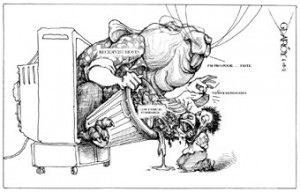Armed, still dangerous
THE NEWS from the forests in Agusan del Sur was decidedly positive. The remaining hostages held captive by a group of armed Manobo tribesmen—12 from the original 16 who were abducted last Friday, plus the father of a kidnapper who tried to mediate on behalf of the government but was held against his will instead—were found abandoned in a forested area several kilometers from Prosperidad town on Wednesday.
Mayor Alvin Magdamit, who bore much of the responsibility for ending the hostage-taking and securing the safety of the hostages as chairman of the local crisis management committee (CMC), said the Manobo tribesmen left the hostages behind on purpose, as a response to the negotiations. To quote the Inquirer report: “He said the hostages were freed at around 6 a.m. after he and Agusan del Sur Gov. Adolph Edward Plaza spoke with the abductors led by Ilad Perez, brother of jailed Manobo tribal leader Ondo Perez.”
Group leader Ilad Perez is all of 17 years old, and his extreme youth could have easily led to a tragic outcome. It is a testament to the skill of the CMC negotiators that the Agusan del Sur abduction, the latest incident to reinforce the country’s unfortunate image as the playground of kidnappers, ended the way it did: without loss of life or limb, without the payment of ransom, without any compromising areglo.
Article continues after this advertisementPerhaps the most crucial decision taken was the temporary release last Sunday of tribal leader Ondo Perez, who is in jail also on kidnapping charges, to help negotiate a resolution to the incident. His participation was a far cry from the abductors’ original demand for Ondo’s unconditional release—but it helped demonstrate both the local government’s sincerity in resolving the issue and the Department of Justice’s (limited) flexibility in dealing with the group’s legal demands.
In the end, the small group of Manobo tribesmen who carried out the crime—and despite the peaceful outcome, it bears repeating that a terrible crime was committed, against several persons who had nothing to do with the tribesmen’s demands and were merely attending a graduation ceremony—were protesting what they (despite what sources close to the negotiations described as a limited comprehension of the operation of law) understood wholly as government neglect and lack of fairness.
These concerns must be addressed, and it is worth noting that Justice Secretary Leila de Lima ordered an immediate review of the pending cases as soon as word of the abductions reached Manila. This seems to us like the application of an important lesson learned from the Aug. 23, 2010 debacle: the official neglect of a pending administrative case that led to the tragic hostage-taking. The immediate convening of a national crisis management committee too, with President Aquino directly involved, seems like another lesson learned. These are important improvements for which the public is grateful. (But the essential role played by Mayor Magdamit also reinforces our conviction that President Aquino must hold Manila Mayor Fred Lim et al. to a strict accounting, too, for their disastrous mishandling of the Aug. 23 hostage-taking. That, surely, is another important lesson that begs to be applied.)
Article continues after this advertisementThe roots of the Agusan del Sur abductions run deep, involving ancestral land claims and tribal rivalries. The incident also bears on the question of armed groups or, in other cases, private armies.
Interior Secretary Jesse Robredo was right to point to the existence of local militia forces as the source of these arms. These groups were given arms in an attempt to involve them in the defense of local communities against rebels and insurgents. But: “After they were separated from the [government-backed militia force], their guns were not recovered and that is why they are armed.”
Another reason why even a 17-year-old like Ilad Perez is armed lies in the nature of the country’s political leadership. Almost everyone campaigns against violence and the proliferation of private armies, but once in power, almost all politicians lack the political will to recover the guns—by one estimate numbering around a million. Partly it’s political dynamics; but partly it’s personal cowardice. In this matter, the Aquino administration must prove itself different from the ones that came before it.

















